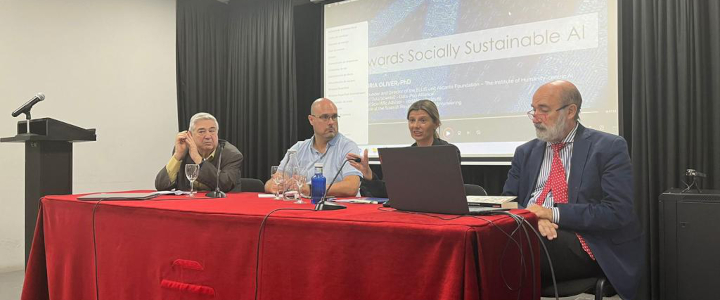
Development of the fourth industrial revolution, with the continual expansion of big data, artificial intelligence and algorithms, poses enormously important challenges that far transcend the world of technology. A new society is being shaped that requires a new social pact, based on an ethical commitment in the use of algorithms, with full respect for fundamental human rights and adaptation of these basic protections to the digital environment.
The Ateneo de Madrid organized a roundtable around these concepts, ‘Ethics, digital rights and algorithms’, which included the participation of, among other experts, Ana Caballero, vice-president of the EADT. The speakers agreed that we are living in a moment of defining transition, one in which artificial intelligence can mean enormous progress but also pose great threats. As Nuria Oliver, director of the ELLIS Alicante Foundation, said, quoting a 2016 speech by Steven Hawking, “The rise of powerful AI will either be the best or the worst thing ever to happen to humanity”. In the worst-case scenario, stated Juan Antonio Garde, president of the Algoverit association, “digitalisation can mean a collapse of the rule of law, and lead to a civilizational crisis”.
Ignacio González, an engineer with a PhD in AI who also belongs to the Algoverit association, was the most categorical in defending the need to connect the use of algorithms to a humanist vision. We have built a society in which the so-called GAFAs know everything about us, “and we live in the neurosis of not wanting to pay the price of their services. If we want free services, we have to pay the price”, said the expert regarding this loss of privacy and the enormous power of the technology platforms. “It’s like the person who wants to eat cheeseburgers and fries every day but be thin”, he added.
González warned of the possible use of data to discriminate, for example, in access to hospital equipment. But algorithms already make decisions in other critical areas, such as the world of work. José Varela, digitalisation manager for the UGT trade union, complained that in the delivery services business “everything is decided by an algorithm”: the allocation of orders, who takes care of them, how much to charge, etc. “It also decides whether they will disconnect me, that is, if they will fire me”. And this use of algorithms, he explained, is also expanding to other sectors. But he wanted to be “optimistic”: There is a certain social awareness now, he said, and “societies tend to find a new balance” in the wake of major social disruptions.
Ana Caballero focused her speech on the dangers of the unethical use of algorithms with an especially vulnerable population: minors. She referred to the European Declaration on Digital Rights and Principles for the Digital Decade to defend the need to protect all children from harmful content and online manipulation and abuse. But she went further, warning of the commodification of their data, often obtained in an opaque manner. “We need to control these practices, even reformulating Article 32 of the Convention on the Rights of the Child [from UNICEF] to include economic exploitation in the digital environment”, she argued.
The EADT is especially antagonistic with certain practices of the major technological platforms with minors, a concern based on revelations like the ones made by Frances Haugen, a former Facebook executive, in the United States Senate: The company has long known that its Instagram application has harmful psychological effects on adolescents but has taken no action. Regulations, such as the one gradually being constructed by the European Union, need to start putting an end to certain practices, but social and public awareness must also do its job.




